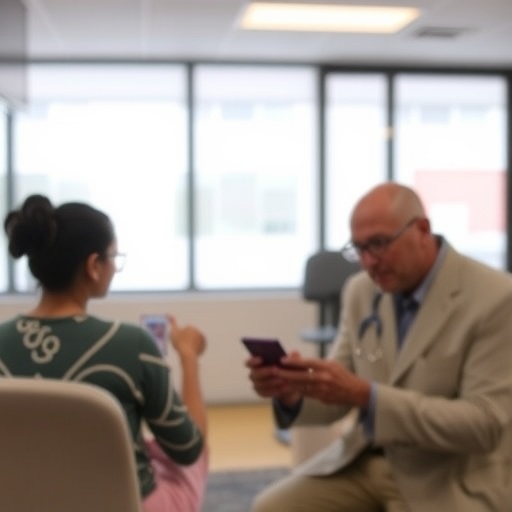In recent years, the intersection of technology and healthcare has paved the way for innovative approaches to managing chronic conditions, particularly in the realm of public health. One emerging trend that stands out is the use of mobile health interventions – a strategy that utilizes mobile devices to support health practices and improve patient outcomes. A recent study focusing on people living with HIV/AIDS in Owerri, Imo State, Nigeria, investigates the impact of such interventions on improving adherence to clinic appointments, which is a crucial element in ongoing treatment and care.
In the study conducted by researchers Ezelote, Nwoke, Ibe, and their team, the aim was to examine how mobile health technologies can serve as a vital tool in ensuring that individuals suffering from HIV/AIDS remain engaged in their healthcare routine. The significance of keeping regular appointments cannot be overstated; it is essential for routine monitoring, therapy adjustments, and prevention of disease progression. However, the challenge remains that many individuals miss these important appointments, leading to worse health outcomes.
This research presents an interesting perspective given that many health care systems face a major hurdle: ensuring patients stick to their treatment schedules. Factors contributing to missed appointments are varied, including stigma, transportation issues, forgetfulness, and a lack of motivation. By leveraging mobile health solutions, the study aimed to address some of these barriers and ascertain whether text reminders, appointment scheduling applications, or telehealth consultations could improve attendance rates.
In this particular study, participants were recruited from several selected hospitals in Owerri. The researchers employed a mixed-methods approach that encompassed both quantitative and qualitative components. Quantitatively, the study tracked the appointment attendance rates of participants before and after the implementation of the mobile health intervention. Qualitatively, interviews and focus groups provided deeper insights into the patient’s experience, barriers faced, and what motivates individuals to keep their appointments.
Initial findings indicated that the integration of mobile health interventions significantly increased the rates of clinic attendance among participants. Not only did this suggest efficacy in improving adherence, but it also pointed to the potential of technology to transform how care is delivered for chronic diseases like HIV/AIDS. The text reminders proved particularly effective, facilitating better communication between healthcare providers and patients. Participants noted that receiving reminders days before their appointments helped them prioritize their healthcare needs amidst daily responsibilities and life’s unpredictabilities.
Telehealth consultations further enhanced engagement, particularly for individuals who faced geographical or health-related constraints to attending in-person. The flexibility of scheduling virtual appointments allowed these individuals to maintain routine care without the barriers posed by physical distance or mobility issues. Such arrangements can lead to timely medication adjustments and immediate consultations for emerging health issues, ultimately promoting better health outcomes.
While the study’s results are promising, it also sheds light on the complexities of healthcare delivery in resource-limited settings. Recognizing that technological solutions do not exist in a vacuum is essential; surrounding infrastructure, digital literacy, and a comprehensive understanding of patients’ needs are fundamental to the successful adoption of mobile health interventions. Moreover, varying levels of access to mobile devices and internet connectivity within different demographics could affect the scalability of such programs.
The implications extend beyond individual patient care; they can influence public health policies at large. If mobile health interventions are proven to be effective, policymakers may consider investing in these technologies as part of comprehensive strategies to combat HIV/AIDS and similar chronic illnesses. Comprehensive integration of such technologies into healthcare systems could lead to a cultural shift toward proactive health management, paving the way for healthier communities.
Despite the clear benefits, challenges remain. Ethical concerns about data privacy and security cannot be overlooked. As mobile health systems often require personal health information to be transmitted electronically, safeguarding this information must be a priority. Equally important is the need for ongoing support for users; training programs may be necessary to ensure that patients can fully utilize these mobile health resources, particularly amongst older populations or those less familiar with technology.
Moreover, the commitment of healthcare workers to adapt their workflows to incorporate mobile health solutions remains paramount. As clinicians begin to rely on these interventions for better patient management, initiatives preparing healthcare staff to coexist with digital platforms could lead to a more streamlined healthcare experience for patients. Recognizing that health is a shared journey between providers and patients will be crucial in employing mobile health technologies effectively.
In conclusion, the study led by Ezelote and colleagues underscores the potential of mobile health interventions in enhancing clinic appointment adherence for people living with HIV/AIDS in Nigeria. As the world continues to contend with health crises exacerbated by access limitations, the role of technology must be acknowledged and harnessed as a means of empowerment. Through determined research, innovative practices, and policy support, there lies an opportunity to transform healthcare delivery for chronic diseases, ensuring that no individual is left behind in their pursuit of optimal health.
Subject of Research: The impact of mobile health intervention on keeping clinic appointments among people living with HIV/AIDS.
Article Title: The impact of a mobile health intervention on keeping clinic appointments among people living with HIV/AIDS receiving care at selected hospitals in Owerri, Imo State, Nigeria.
Article References:
Ezelote, C., Nwoke, E., Ibe, S. et al. The impact of a mobile health intervention on keeping clinic appointments among people living with HIV/AIDS receiving care at selected hospitals in Owerri, Imo State, Nigeria.
BMC Health Serv Res 25, 1354 (2025). https://doi.org/10.1186/s12913-025-13541-8
Image Credits: AI Generated
DOI: 10.1186/s12913-025-13541-8
Keywords: mobile health, HIV/AIDS, clinic appointments, health intervention, Nigeria.
Tags: barriers to clinic attendance for HIV patientshealthcare engagement for HIV/AIDSimpact of mobile health on treatment outcomesimproving clinic attendance for HIV/AIDSinnovative healthcare solutions in Nigeriamobile devices in chronic disease managementmobile health interventions for HIV patientsmonitoring and therapy adjustments for HIVpatient adherence to healthcare appointmentspublic health strategies for chronic conditionsreducing stigma in healthcare for HIVtechnology in public health





